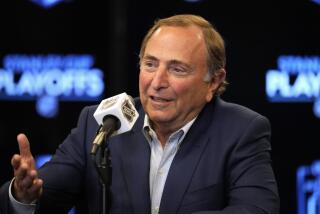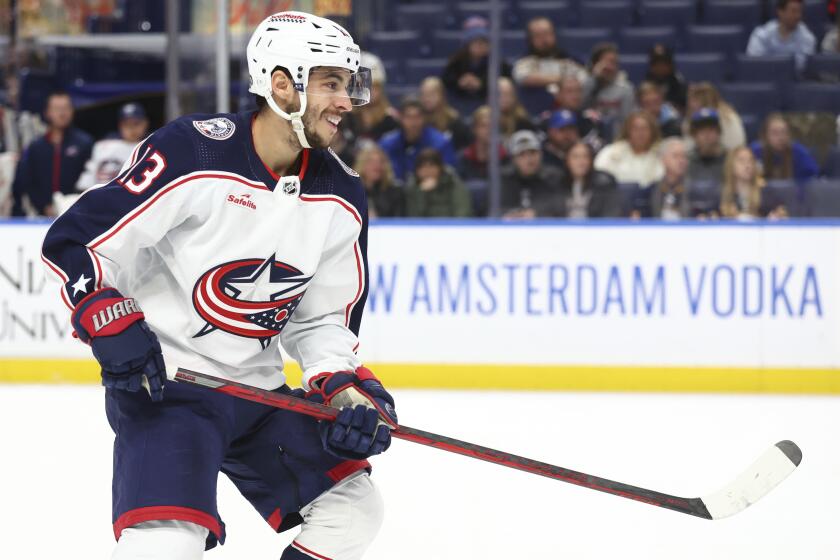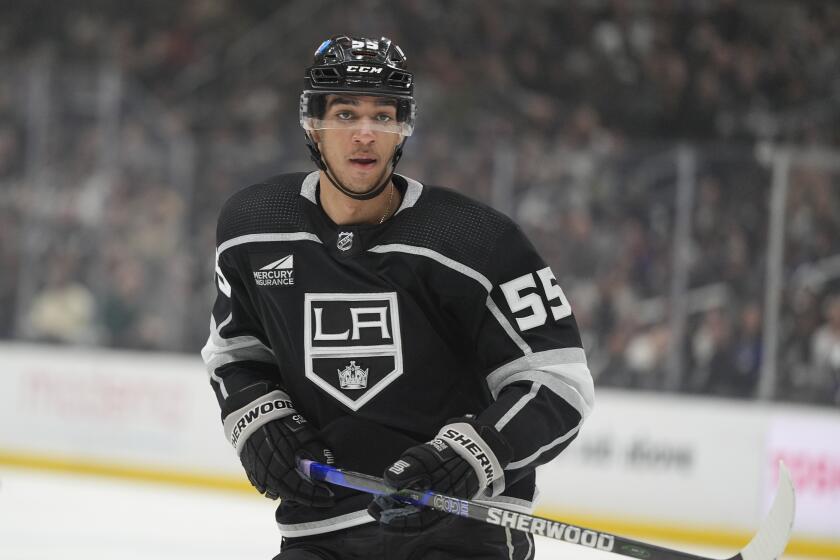Kings take stock of what worked and what didn’t
The Kings had no practice Monday, no charter flight to Vancouver for the seventh game of a playoff series they believed they could win until the final buzzer signaled the end of their 4-2 loss to the Canucks and their season.
Their first postseason experience as a group and the first for the franchise since 2002 concluded Sunday in ways that were both disheartening and encouraging.
The team that was 29-0-2 this season when leading after two periods lost Games 4 and 6 after squandering third-period leads at home. The Kings’ goaltending wasn’t good enough — Jonathan Quick won only two of his last 14 starts, including the playoffs — and their lack of speed on defense was glaring when the Canucks pushed the pace. Their power play was exceptional, but their five-on-five scoring was inadequate, reflecting a lack of depth, especially up the middle.
But Drew Doughty and Jack Johnson established themselves as pressure players, Anze Kopitar grew up, Dustin Brown led by bloody example and Wayne Simmonds matured into a quality two-way forward who backs down from no one.
“It’s safe to say we took a step forward this year and had success,” General Manager Dean Lombardi said Monday, “but that success is useful only if we learn why we failed.”
Players took Monday off to rest, shave their playoff beards and prepare for exit interviews Tuesday with the coaches and training staff. Lombardi was at work at the team’s El Segundo practice facility.
“Next season essentially starts now,” he said. “Part of the message we’re giving them as we’re sending them off is that this is the first meeting for next season.”
The message Lombardi sends should be this:
Be proud of what you did but acknowledge that it wasn’t nearly enough.
Come back in better shape next season, Anze, and you might crack 100 points.
Work out hard this summer, Drew, and you won’t gasp at the end of those one-minute-plus shifts you averaged against the Canucks.
Keep your confidence, Jack, but don’t let it become arrogance.
The message to Quick must be that he will have to fight to keep the starting job even though he won a franchise-record 39 games this season and might have been the team’s most valuable player in the early going.
His second-half fade was as surprising as it was unstoppable.
Pick a possible reason: He was overused by Coach Terry Murray and then was jolted out of his routine during the Olympics, where he was Team USA’s third goalie and got little quality practice time. He and his wife, Jaclyn, became parents March 12, a happy event but disruptive to sleep patterns.
Jonathan Bernier, impressive in three NHL starts this season, is too good to return to the American Hockey League. Quick must take his game to a higher level or watch from the bench — or be traded.
Lombardi said it’s not fair to blame Quick alone because “a lot of nights he had company” in lacking sharpness.
True enough.
“One thing about Jon, the kid is a competitor,” Lombardi said. “When we first got him out of college he was a great athlete, but he had no technique. He had to learn to tighten his holes. Now, you start to see those holes creep in and those habits sneak in again.”
Being pressed by Bernier, voted the AHL’s best goalie and a first-team All-Star, should determine whether Quick can regain his feistiness or be labeled a one-season wonder.
There’s one more message players should hear Tuesday: That Lombardi and his boss, Tim Leiweke, will be aggressive in filling the holes that showed up this season.
Bernier, center prospect Brayden Schenn and young defensemen Thomas Hickey, Colten Teubert and Viacheslav Voynov should contend for roster spots. There will be a spare goalie to trade. Lombardi will have cap space to make an impact move via free agency, even if he declines to pay Ilya Kovalchuk $10 million a year for a decade.
Leiweke said he and Lombardi will meet in the next few weeks to review the season and discuss next season’s budget.
“I am happy with the season, although I felt that we could have won that series,” Leiweke said via e-mail. “Now we know what it takes to get to the next level. I don’t think anyone in the organization is happy today. And that is a good thing.”
The best thing to come out of this season would be their refusal to settle for mediocrity anymore.
twitter.com/helenenothelen
More to Read
Go beyond the scoreboard
Get the latest on L.A.'s teams in the daily Sports Report newsletter.
You may occasionally receive promotional content from the Los Angeles Times.





